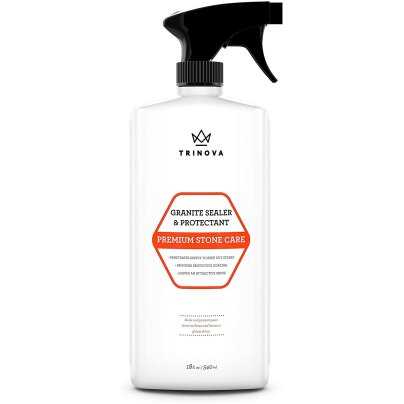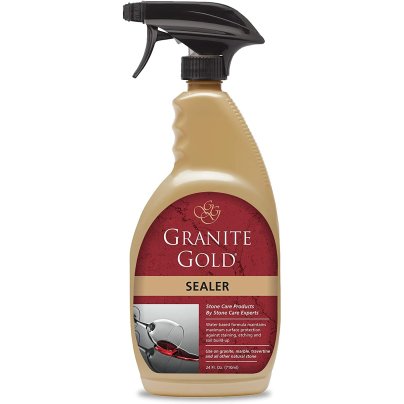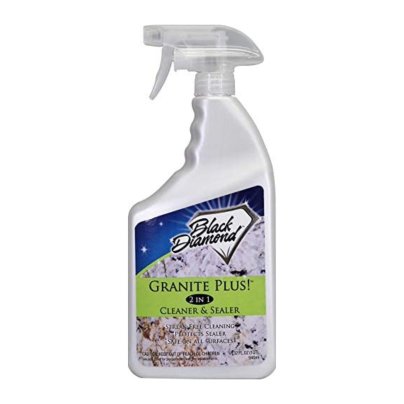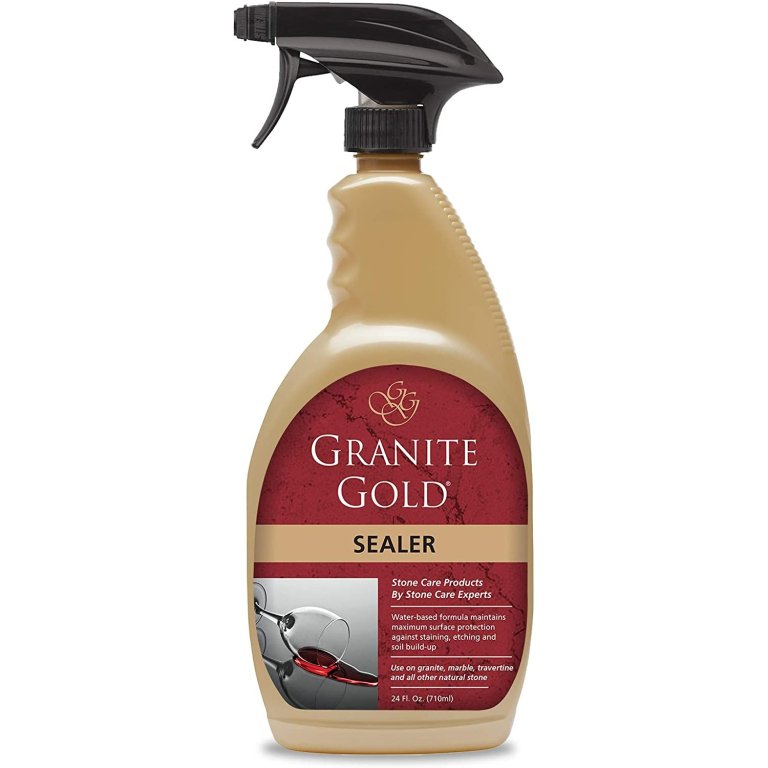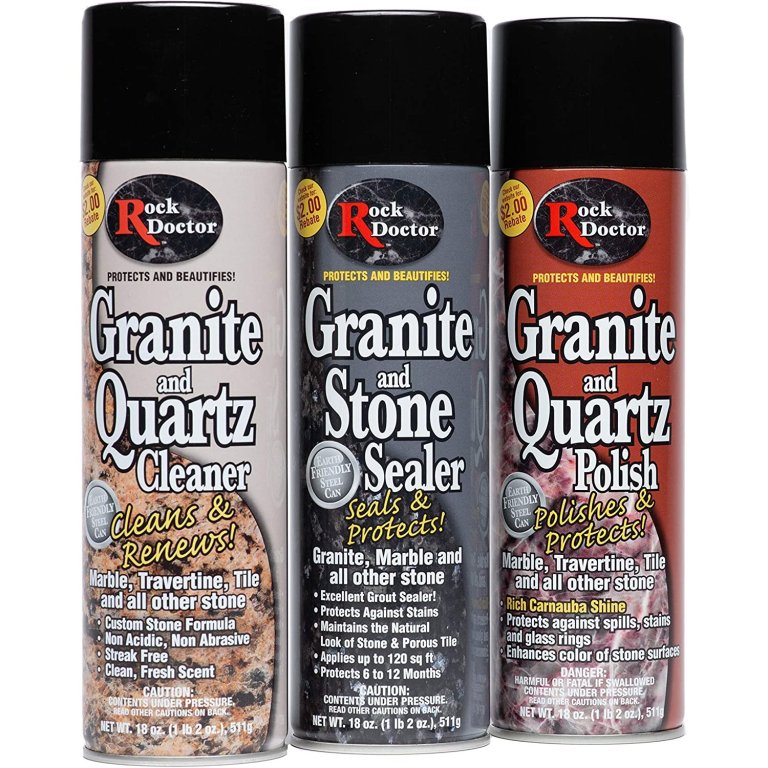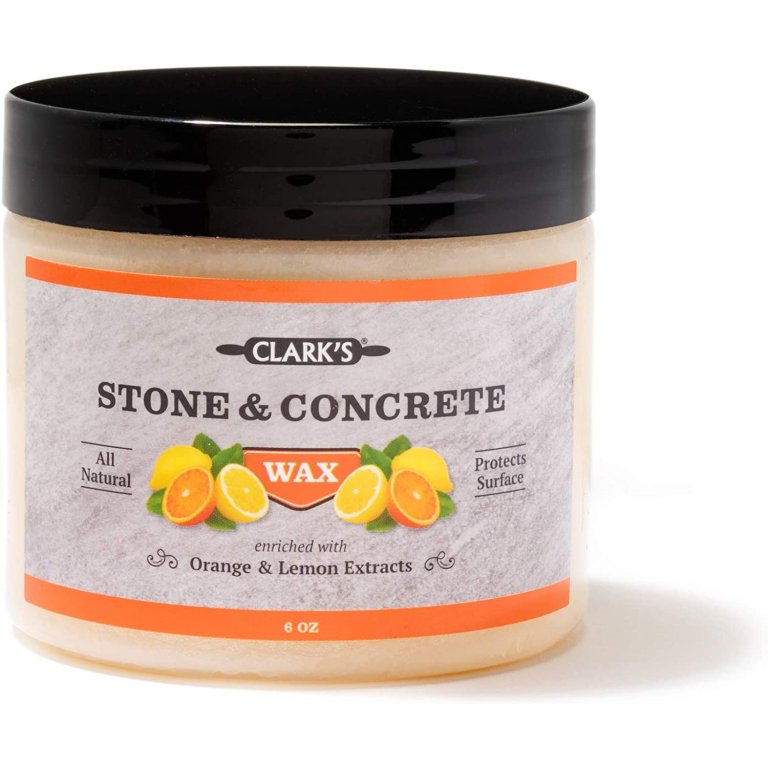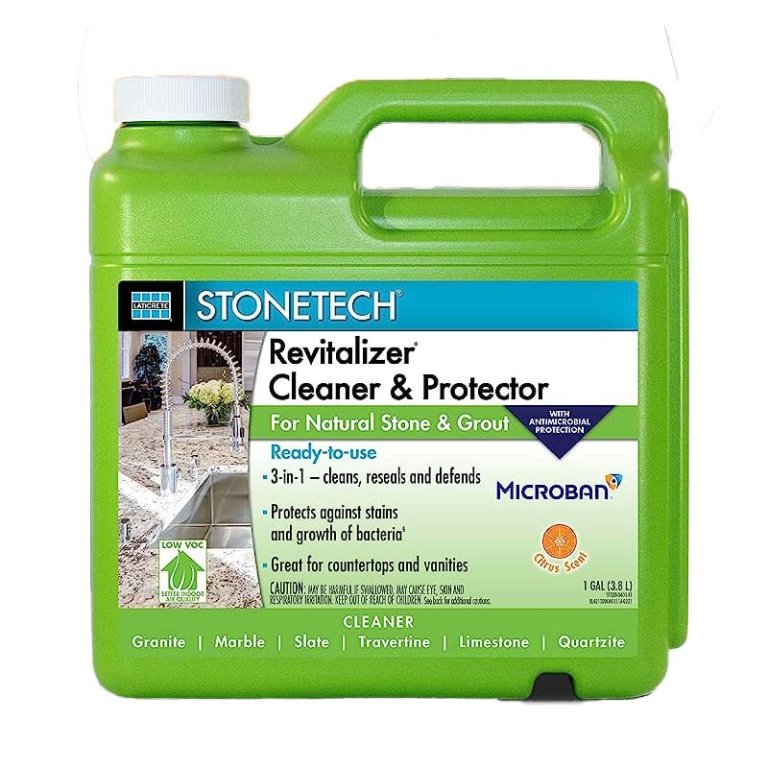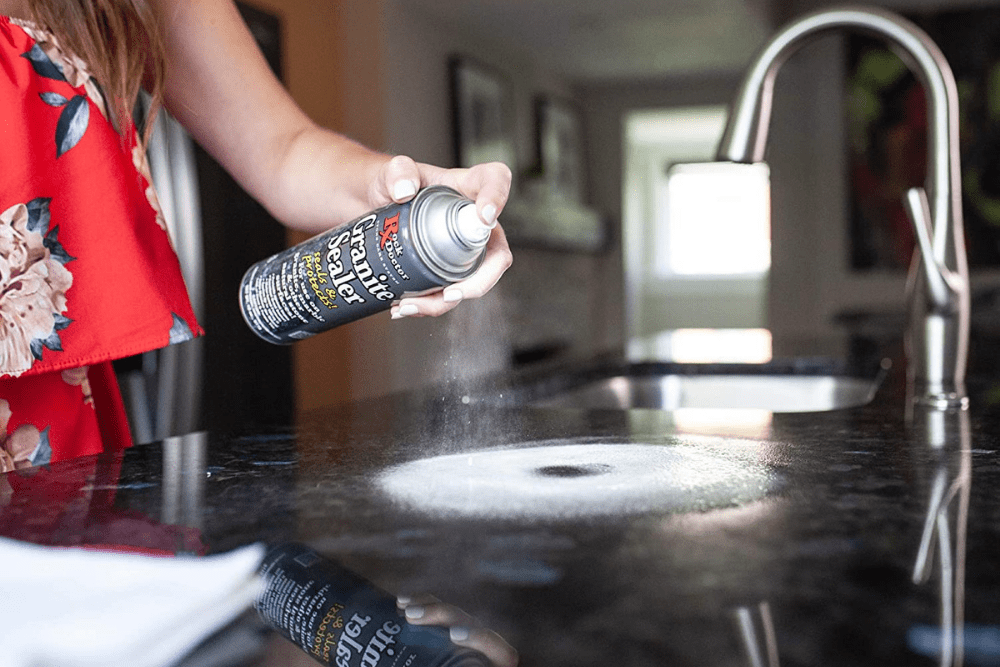
We may earn revenue from the products available on this page and participate in affiliate programs. Learn More ›
Granite is an investment. It’s costly, and, in fact, it may be the most expensive feature in the kitchen or bathroom. But when the longevity of natural stone and the extra value it adds to the home are taken into account, the purchase may justify the cost. A properly maintained granite surface can last up to 100 years.
To get the most value out of such a large purchase, taking care of your granite is important. Regularly sealing the porous surface to protect it from penetrating liquids, foods, and stains can help keep granite looking its best for its whole life. Read this guide for assistance in choosing the best granite sealer for your stone surfaces.
- BEST OVERALL: TriNova Granite Sealer & Protector
- RUNNER-UP: Granite Gold Sealer Spray
- BEST BANG FOR THE BUCK: Black Diamond Stoneworks GRANITE PLUS!
- BEST WITH POLISH: Rock Doctor Granite & Quartz Care Kit
- BEST FOR COUNTERTOPS: Clark’s Soapstone Stone & Concrete Wax
- MOST VERSATILE: StoneTech RTU Revitalizer, Cleaner & Protector
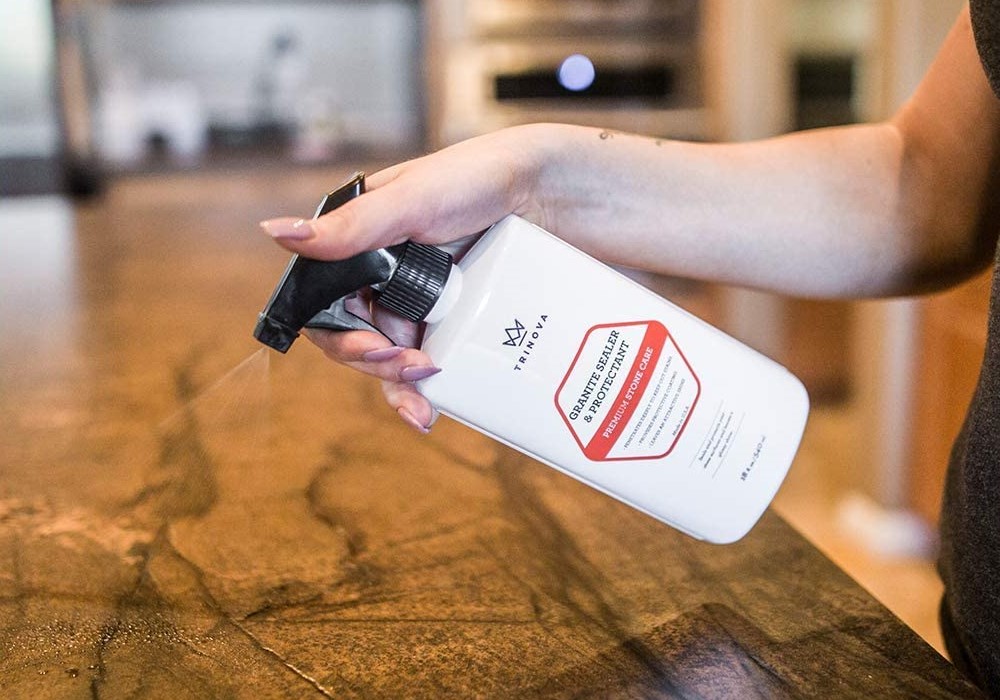
How We Chose the Best Granite Sealers
We researched the most sought-after granite sealers in their respective categories and discovered that the best options are determined by their type, form, quantity, formula, ease of use, and other special features included by top brands.
While searching for the best granite sealers available, the most popular types among users were the penetrative, enhancing, and topical granite countertop sealers in spray, wax, or liquid form. These top picks range from 18 ounces to 1 gallon, so there’s ample quantity for multiple uses. While some of these picks are made with chemical compounds, some picks are natural, water-based, and/or biodegradable, making them safe for use near food, children, or pets.
Since many of our top picks have spray-on applications, most are easy to use and cure in under 24 hours. Finally, some of these top picks come with built-in cleaners, polishes, and sealers to prevent stains and repel water.
Our Top Picks
With this background on the types of granite sealers and the important factors to keep in mind, it’s time to start shopping for the best granite sealer. Below is a list of some of the best granite sealers on today’s market.
Best Overall
TriNova Granite Sealer & Protector
Pros
- Easy to apply, and penetrates the stone surface for long-lasting protection
- Water-based emulsified polymer that cures quickly, and contains no dangerous volatile chemicals
- Versatile formula that is safe to use with multiple types of natural stone
Cons
- Does not remove water stains; user will also need to use a polish
Product Specs
- Type: Penetrative
- Form: Spray
- Quantity: 18 ounces
For a one-stop sealer that both penetrates and creates a protective surface layer, Granite Sealer & Protector from TriNova is worth checking out. This sealer comes in an 18-ounce spray bottle for easy application on countertops and other granite surfaces. Because it’s water-based and doesn’t contain volatile chemicals, it’s safe to use in closed spaces.
The TriNova formula is easy to apply. Simply spray it on the surface, allow it to penetrate for 1 to 2 minutes, and then wipe it off. It cures completely within 1 hour.
Get the TriNova granite sealer and protector at Amazon or Lowe’s.
Runner-Up
Granite Gold Sealer Spray
Pros
- Spray-on water-based formula protects against stains, etching, and dirt buildup
- Works on granite, marble, travertine, limestone, slate, and other porous natural stone surfaces
- Contains no phosphates or ammonia, and safe on food preparation surfaces
Cons
- 2 or 3 coats are recommended 24 hours before use, making the sealing process longer
Product Specs
- Type: Penetrative
- Form: Spray
- Quantity: 24 ounces
Those who need a food-safe countertop sealer that’s easy to apply and versatile for several surfaces may want to try Granite Gold sealer spray. This water-based sealer comes in a 24-ounce spray bottle and provides a protective surface layer that resists stains and scratches. It works on granite, marble, travertine, and other natural stones.
Applying Granite Gold sealer spray is a straightforward process. Simply spray the surface of the countertop and immediately wipe it off. The surface might require two or three further applications, so wait 20 minutes between each application. The sealer will cure completely in 24 hours.
Get the Granite Gold granite sealer at Amazon, Lowe’s, and The Home Depot.
Best Bang For The Buck
Black Diamond Stoneworks GRANITE PLUS!
Pros
- Simple yet effective spray-and-wipe formula at a very competitive price
- Versatile, kid-safe cleaner and sealer in one that works with any natural stone surface
- PH-neutral, streak-free, and with regular application can produce a high shine
Cons
- Intended for day-to-day maintenance rather than as a high-strength sealer
For one of the most straightforward approaches to both cleaning and sealing granite surfaces, check out Black Diamond Stoneworks GRANITE PLUS! 2-in-1 Cleaner and Sealer. It’s easy to use and leaves behind a streak-free, protective shine. Its environmentally friendly formula works on stone surfaces and comes in a 32-ounce bottle.
To use this Black Diamond Stoneworks countertop sealer, simply spray it on the granite surfaces and wipe until it’s clean and dry. The built-in sealer leaves a top layer that seals the porous surface and protects it from stains. It also makes stone surfaces easier to clean in the future.Product Specs
- Type: Enhancing
- Form: Spray
- Quantity: 32 ounces
Get the Black Diamond GRANITE PLUS! granite sealer at Amazon or Walmart.
Best With Polish
Rock Doctor Granite & Quartz Care Kit
Pros
- 3-pack of polisher, sealer, and cleaner formulated for granite, quartz and other stone surfaces
- Can renew minor cracks in surfaces, and contains carnauba wax for a high shine
- Nonabrasive, nonacidic formula contains no harsh chemicals, and it has a pleasant, mild scent
Cons
- Not recognized by the FDA
- Can cause serious eye irritation
Product Specs
- Type: Penetrative and enhancing
- Form: Spray
- Quantity: 18 ounces (per can)
Rock Doctor’s granite and quartz care kit might be the best option for those looking for a kit that not only cleans and seals, but also polishes stone surfaces to a bright, shiny finish.
This kit includes three aerosol cans: a cleaner, sealer, and polisher. After using the spray cleaner to clean the surface, use the sealer to penetrate and bond with the stone, creating a long-lasting seal against stains.
After the surface is clean and sealed, the polish creates a water-resistant protective coating to further prevent stains, spills, and etching. The polish contains carnauba wax and special emollients that will fill small cracks and scratches, leaving behind a shiny and smooth surface.
Get the Rock Doctor care kit at Amazon or The Home Depot.
Best For Countertops
Clark’s Soapstone Stone & Concrete Wax
Pros
- Formulated for granite countertop and other stone surfaces using all-natural ingredients
- High-build carnauba and beeswax create a hard-wearing, protective layer
- Nongreasy, satin finish includes food-grade mineral oils safe for kitchen surfaces
Cons
- Requires more effort to apply than many other products, and has a premium price tag
Instead of using chemicals to clean or seal the granite countertop, Clark’s Soapstone Stone & Concrete Wax uses all-natural ingredients, such as beeswax, carnauba wax, mineral oil, lemon oil, and orange oil. Clark’s uses a higher concentration of carnauba wax than most of its competitors, so it can provide a tough layer of protection against water and stains.
To apply the wax, simply rub it onto the countertop and allow it to absorb into the surface. Once it dries to a haze, buff it off with a clean pad.Product Specs
- Type: Enhancing
- Form: Wax
- Quantity: 6 ounces
Get the Clark’s granite sealer at Amazon.
Most Versatile
StoneTech RTU Revitalizer, Cleaner & Protector
Pros
- Easy-to-use multisurface cleaner that also protects against staining, mold, and mildew
- Both cleans up everyday messes and reseals the surface for greater stain resistance
- Safe, water-based, biodegradable, and antibacterial formula with a light, citrus scent
Cons
- For full protection, a stronger sealer should also be used every few years
For one product that cleans and protects several surfaces, check out StoneTech’s RTU Revitalizer, Cleaner, and Protector. The product comes in a 1-gallon bottle and works on granite, marble, limestone, travertine, slate, sandstone, flagstone, and quartzite. It cleans and protects countertops, vanities, and tile surfaces. The water-based formula is safe to use in the home, and it’s biodegradable.
The spray-and-wipe formula is easy to apply to surfaces. It has a built-in sealer that remains on the surface after wiping to create a topical coating that protects from stains and scratches. The sealer also makes future spills and cleanup easier, and it has a pleasant citrus scent.Product Specs
- Type: Enhancing and topical
- Form: Liquid
- Quantity: 1 gallon
Get the StoneTech granite sealer at Amazon.
Jump to Our Top Picks
What to Consider When Choosing a Granite Sealer
Besides the different types of granite sealers, there are other features and attributes to look for in a sealer. This section outlines the most important things to keep in mind while shopping for the best granite sealers for your stone surfaces.
Types of Granite Sealers
Granite is a big investment, so homeowners want to keep it in tip-top shape; that means keeping it clean and regularly maintaining it with a sealer. Not only should granite be sealed, but it also must be cleaned. A wide variety of products are available for cleaning granite surfaces.
A plethora of granite-care products are available in today’s market. Many of those products serve the same purpose, but they do so with different methods. The three most popular sealants are penetrating, enhancing, and topical sealers.
Penetrating Sealers
Penetrating, or impregnating, sealers protect granite surfaces by plugging the porous surface with resins. Solvent- and water-based penetrating sealers are available, both of which help the resins soak into the pores. Once the water or solvent dries, it leaves the resins behind to protect the surface from stains.
Penetrating sealers do most of their work from under the surface, so they don’t offer much protection against scratches and etching from acidic substances. Also, these sealers offer stain resistance, not stainproofing.
Enhancing Sealers
Older granite surfaces may need an enhancing sealer. They enrich the look of the countertop by soaking deeply into the surface to create a shiny, wet look. They often can reinvigorate older, dull surfaces.
While the process is complicated to explain, the idea is that an enhancer helps the stone do a better job of reflecting light, creating a shiny, yet darker, surface. Most enhancing compounds also provide a bit of sealant protection, much like an impregnating or penetrating sealer.
Topical Sealers
Topical sealers create a layer of protection on the outermost layer of the stone. They create a shiny, glossy finish, and they protect the surface from scratches, dull spots, and other undesirable marks. They work well on flooring, mantels, and other rougher stone surfaces. The rugged texture of these materials gives these types of sealers a “tooth” onto which they can grip to create long-lasting protection.
Topical sealers aren’t always ideal for countertops. Some don’t apply particularly well to smooth surfaces, and they can also block moisture from escaping the stone, causing cracks when the moisture tries to escape. Use a product meant specifically for countertops.
Form
Granite sealers come in a few different forms, including sprays, liquids, waxes, and polishing compounds. Consider each type of product’s capabilities to determine which may work best for your needs.
- Liquids, whether in a spray bottle or jug, have the best chance of penetrating into the granite, enhancing and protecting the granite from within. These sprays also come in aerosol cans, allowing fast coverage.
- Polishing compounds, which are usually thicker, take a bit of elbow grease to apply. Much like waxing the surface of a car, the compound must be worked into the surface of the stone to ensure even protection.
Finish
All sealers help protect granite surfaces, but some can leave behind a shiny finish that looks great.
A basic sealer helps create a shiny finish that reflects a bit more light than a nonsealed surface. An enhancing sealer provides a wet look, but to really create a bright, light-reflecting surface, a granite polish works best.
Polishing the granite surface creates a very glossy, shiny surface that can make an impact. Moreover, polishing the stone usually reduces the amount of tiny scratches that rob the granite of its light-reflecting properties.
Longevity
Sealing granite surfaces can take a bit of effort. For example, to seal granite flooring, the countertops must be cleaned and all furniture removed from the room.
Experts vary in their recommendations as to how often to seal granite, but most say it should be sealed every 3 months to once a year. In high-traffic areas, 3 months might be a good goal, while every 6 months may be enough for other places. Many of the best sealers can last several years.
Safety
The chemicals in granite sealers are no more dangerous than those in most popular household cleaners. Sealers need to cure on surfaces to be effective. It may take a day or two for some sealers, but once cured, they’re completely safe to touch, prep food on, and anything else you might do on a granite surface.
Pay attention to the directions on the bottle when using a solvent-based sealer. Many manufacturers suggest using these chemicals in a well-ventilated room, which can pose a challenge during colder months. However, once the solvent dissipates, which is rather quickly, the surfaces are safe.
Also, many manufacturers recommend that users wear gloves and safety glasses as they seal their countertops. Wearing a mask to avoid vapors or odors also might be a good idea.
Application
Considering how to apply the granite sealer is a major factor in choosing the best granite sealer. While a spray bottle might work well for a countertop, an aerosol probably works better on a large floor or shower. Also, some sealers need to sit on the surface longer than others to soak into the stone.
Understand what each sealer requires to provide adequate protection. Finding a stain because you missed a step is an expensive mistake that could cost a lot to remedy.
Versatility
In homes with a variety of different granite or stone surfaces, choosing a sealer that works on multiple surfaces may be the best bet. Stone sealers can work on multiple materials.
Most importantly, however, check that the product works specifically on granite. Granite has some different properties from stone like sandstone and marble, but some products will seal them all with one formula.
FAQs
The following section is a collection of the most frequently asked questions about granite sealers. If you still have questions about using the sealer, reach out to the manufacturer and speak with a customer service representative.
Q. How often should you seal granite countertops?
Experts disagree as to how often granite should be sealed. A good rule of thumb is to test the surface every 3 to 6 months to determine if it needs sealing. To test it, simply drip a bit of water onto the granite and wait half an hour. If a damp ring appears around the puddle, you should seal the granite.
All the granite experts agree that no granite surface is exactly the same. In fact, darker colors like black, gray, and blue might not require much sealing at all.
Q. How long do you have to wait to use countertops after sealing granite?
Each product has its own curing time, and it’s absolutely vital that you follow the manufacturer’s instructions. Using the surface before the sealer has cured properly can result in stains that are very difficult to remove.
Granite cleaners that have sealing additives are ready almost immediately, while others take around an hour. The best granite sealers in terms of the level of protection they provide take about 24 hours to harden completely.
Q. Does granite sealer darken granite?
Initially many granite countertop sealers give the appearance of darkening the surface, but this is much like the effect you see when getting water on any natural stone. Once the product dries, the granite returns to its original color, and the sealer is effectively invisible.
However, effects do vary with different products. Some sealers penetrate the surface more than others giving granite a darker appearance as a result. This is simply the sealer enriching the countertop’s natural color rather than actually darkening it, and in most cases it will lighten over time. If you are concerned about the visual impact of a particular product it is probably worth checking the application instructions, and customer feedback, to see how it behaves.
